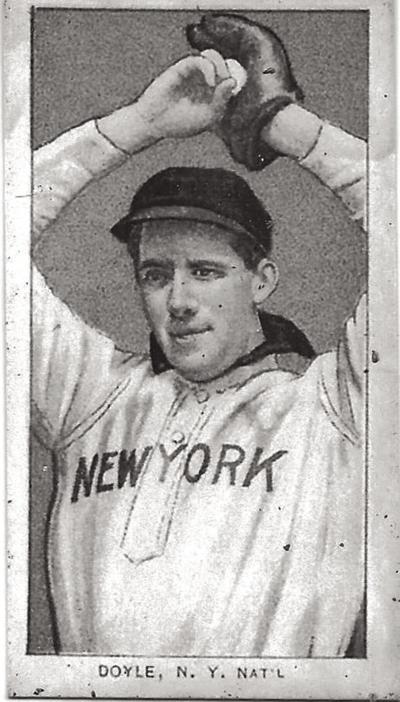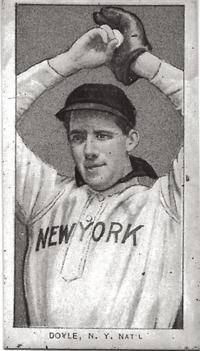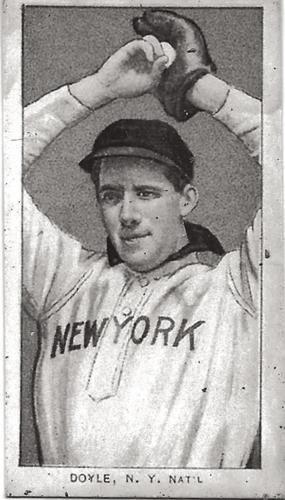Slow Joe Doyle, professional baseball player, 1906-1910 and propristor of Doyle’s Garage in Haines Falls.
Slow Joe Doyle was born on a farm in Leonardville, Kansas, in 1881. Doyle, the youngest child of Thomas and Susan Taylor Doyle, was named Judd Bruce Doyle, but he wasn’t fond of that name.
Young Mary Lackey of Tannersville frequented New York baseball games and soon met Slow Joe. They were married in 1910. Mary was the daughter of the prominent Lackey Family, Michael and Julia Farrell Lackey, with homes in Tannersville and New York City. Mary’s sister, Clara Lackey, was the editor of the Tannersville Times Newspaper and managed Tannersville’s busy insurance and real estate office.
Judd, aged 15 years, 150 pounds, and 5’8” tall, played baseball for local team Leonardville Blues for three years before signing with them. Judd, even then, at a young age, was said to be known for his strong right arm.
Eventually, he ended up in New York. The paper said, “That was the start of an odyssey the likes of which still fires the dreams of boys today, taking Doyle from the pastures of Leonardville to the ball diamonds of New York City.”
A 1907 paper said Doyle was one of the slowest workers in baseball. Games, at that time, were 10 innings, and Doyle was so slow pitching that fans left the games early and were disgusted.
A 1957 report by the Chicago Tribune said that in 1910, radios announced that Doyle would pitch for the Highlanders (later the N.Y. Yankees), and there was a rush of fans to the phones to tell their folks they would be late for supper.
Before “Slow Joe,” his first nickname was “Long-Winded,” followed by “For gosh sakes, hurry up.” “Slow Joe” finally stuck.
Doyle pitched professionally for the New York Highlanders from 1906 -1910. In his first major league appearance, he hurled a six-hit shutout. Sporting Life summed up his debut:
“For a minor leaguer to jump to New York and face (Nap) Napoleon Lajoie and his [Cleveland] fence breakers is a pretty big undertaking, and to hand them a shutout was a feat fully appreciated by the fans who cheered the newcomer heartily…Doyle ran a gamut of curves, a fast drop ball, spitball, change of pace and overhand, underhand and three–quarter delivery, and pitched the Cleveland Naps into a state of bewilderment.” The press called Doyle, “the human snail, he must be getting paid by the hour.”
His next game was also a shutout against the Washington Senators.
Doyle (and others) used spitballs, dirty balls smeared with mud or tobacco spittle. They were later banned by 1920.
Doyle began the year 1910 with the New York Highlanders but was soon sold to the Cincinnati Reds.
Sadly, Doyle’s professional career ended in 1915 from an injury to his pitching arm.
After his injury, Slow Joe and his wife, Mary Lackey, moved to the Mountain Top. They had three sons, Edward, Jerome and Walter. Slow Joe Doyle opened Doyle’s Garage, which spanned the creek at 23A & North Lake Road in Haines Falls. His family operated Doyle’s until 1950.
Slow Joe died in 1947 at 66 years and rests at Tannersville’s Evergreen Cemetery.
His collector’s baseball card contained an error which was quickly fixed. Those few sold cards are worth $550,000 today.
It was fun studying Slow Joe Doyle’s story. It’s nice to see a farm boy growing up without much money, making it to the big league. That’s history. Thank you, Judd Bruce.
Stay safe, take care, and thanks for reading. — Dede Terns-Thorpe/Hunter Historian










